大学英语精读05-06(04)期中试卷讲课讲稿
大学英语精读(第三版)Unit_1-5讲稿

⼤学英语精读(第三版)Unit_1-5讲稿College EnglishIntensive ReadingBook OneUnit OneTeaching PlanI. Objectives and Requirements:1、Reading and Writing Course教学⽬标:1. To understand the true meaning of “language learning strategy” and talk about it;2. To read the text and try to evaluate and practice the strategies introduced in the text;3. To write a paragraph stating how you plan to develop your listening comprehesion and payattention to the use of connectives;4. To learn some reading techniques and skills: how to read a text and predict the writer’s ideas.;5. To master the key phrases and some sentence patterns.教学要求:1.要求学⽣掌握本单元的中⼼思想和⽂章结构,学会在写作中恰当使⽤关联词。
2.掌握新单词、句型的使⽤⽅法;加强相关听说训练。
3. 掌握阅读技巧:寻找关键词和句。
教学建议:1.在教学过程中启发学⽣开展关于“学习策略”的探讨,帮助学⽣树⽴和培养⾃主学习、⾃我探究的学习⽅式,掌握必要的学习策略,激发学习潜能。
2.提供最新的资料背景知识,如视频,新闻报道等。
2、Listening and Speaking CourseUnit 1: learn to listen for Names, introduce yourself or others in a conversation, understand and talk about college life.3、C omprehensive Exercises BookUnit 1: The students finish the exercises in their spare time.II. Teaching arrangement & Time Allotment1)Reading and Writing Course 6 periods2)Listening and Speaking Course 2 periods (every two weeks)III. Teaching MethodsCommunicative ApproachLearner-centered TeachingTask-based LearningTranslation MethodMultimedia ApproachIV. Presentation ProceduresLecture notesText: Some Strategies for Learning EnglishPart I. Background Information:1. Today’s English: Worldwide over 1.4 billion people live in countries where English has offical status. One out of five of the world’s population speaks some English. And at present one in five is learning English. With economic globalization and China’s opening up to the world, it has become increasingly important for the younger generation to master English. In a sense, English is not teachable, but learnable.2. Language learning strategies: They are used by learners to complete speaking, reading, vocabulary, listening or writing activities presented in language lessons. Recognizing that there is a task to complete or a problem to solve, language learners will use whatever strategies they possess to attend to the language-learning activity. Possible language learning strategies include: using practice opportunities, self-evaluation, selective attention, time management, reviewing notes taken in class and checking one’s understanding, constantly seeking answers to questions instead of passively receiving information, ect.3. Input-output balance theory in language learning:Input in language learning refers to information read, seen or heard by the learner, while output refers to what the learner produces in writing or speaking. The input-output balance theory in language learning believes that one can learn a language well through maintaining a balance between input and output.Part II. Warm-up Activities:Step 1. Ss Introduce themselves and talk about new college life.Step 2. Topic-centered Discussion(Group work)1.Do you enjoy learning English? Why or why not?2.What do you think is the most effective way of learning English?3.What is the greatest difficulty you have in your learning of English?Step 3. T makes a brief introduction to English learning and learning strategies.Part III. Text Analysis:Main Ideas: (Summary Writing)English as an international language is of vital importance for everybody to learn. Learning English is (绝⾮易事) by no means easy. Besides (持续的刻苦努⼒) sustained hard work, we need employ some learning strategies to (促进我们的学习) facilitate our learning.(我们应当以不同的⽅式对待⽣词) we should deal with new words in different ways. Active words demand constant practice while passive words only need to be recognized. As we try to understand the meaning of a word, we are also reminded of (它们的习惯⽤法) their idiomatic usage.Listening, speaking, reading and writing are the four basic skills that (我们不断努⼒试图获得的) we are constantly trying to acquire. In order to improve the four skills, we are suggested to listen to English every day, (抓住⼀切机会说英语) seize every opportunity to speak, read widely (难度适中的材料) materials at a proper level of difficulty and write regularly. Listening and reading (为我们提供语⾔输⼊) provide uswith language input and we are expected to (实际运⽤我们所学的东西) put what we have learned into practice through speaking and writing.Structure:A strategy refers to a set of carefully planned methods for achieving something that is difficult and may take a long time.In introducing some strategies, the author adopts the structure of Problem—Strategy within a paragraph to show us the problems in English learning and then proposes strategies to solve the problems. Please scan the text for some examples of the Problem—Strategy structure.Problems Strategies1. It is impossible to memorize 1. Deal with ative vocabulary and passive all the new words you are learning. vocabulary differently.2. Yo u don’t know the idiomatic 2. Watch out for not only the meaning of a usage of some words. word but also the way it is used in dailylife.3. You may not be able to catch a 3. Listen to it over and over again.lot after listening to a passagefor the first time.4. There are few situations for you 4. Seize every opportunity to speak English to practice speaking English at school. with or without a partner.Part IV. Learning points:1). Find out the active expressions:1. by no means not at all2. at fault responsible for something bad that has happened3. watch out for look out for; be on (one's) against4. seek out look for; try to find someone or something, especially whenthis is difficult5. put…into practice carry out or performTranslate the following into English:1. 我对⽬前的表现⼀点也不满意。
大学英语精读教案
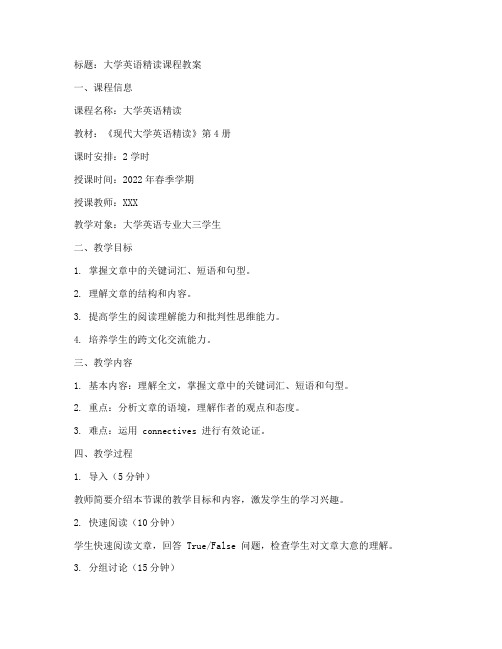
标题:大学英语精读课程教案一、课程信息课程名称:大学英语精读教材:《现代大学英语精读》第4册课时安排:2学时授课时间:2022年春季学期授课教师:XXX教学对象:大学英语专业大三学生二、教学目标1. 掌握文章中的关键词汇、短语和句型。
2. 理解文章的结构和内容。
3. 提高学生的阅读理解能力和批判性思维能力。
4. 培养学生的跨文化交流能力。
三、教学内容1. 基本内容:理解全文,掌握文章中的关键词汇、短语和句型。
2. 重点:分析文章的语境,理解作者的观点和态度。
3. 难点:运用 connectives 进行有效论证。
四、教学过程1. 导入(5分钟)教师简要介绍本节课的教学目标和内容,激发学生的学习兴趣。
2. 快速阅读(10分钟)学生快速阅读文章,回答 True/False 问题,检查学生对文章大意的理解。
3. 分组讨论(15分钟)学生分成小组,讨论文章中的关键词汇、短语和句型,分享学习心得。
4. 词汇讲解(15分钟)教师讲解文章中的关键词汇、短语和句型,引导学生运用所学知识进行分析。
5. 深入阅读(30分钟)学生深入阅读文章,分析文章的结构和内容,理解作者的观点和态度。
6. 小组展示(10分钟)各小组展示讨论成果,分享对文章的理解和感悟。
7. 课堂小结(5分钟)教师总结本节课的主要内容,强调重点和难点。
8. 作业布置(5分钟)教师布置作业,要求学生复习本节课的内容,并进行相关练习。
五、教学方法1. 讲授法:教师讲解文章中的关键词汇、短语和句型,引导学生进行分析。
2. 讨论法:学生分组讨论,分享学习心得,培养合作精神。
3. 案例分析法:教师提供实例,引导学生运用所学知识进行分析。
4. 小组展示法:学生分组展示讨论成果,提高表达能力和交流能力。
六、教学评价1. 课堂参与度:观察学生在课堂上的发言和讨论情况,评估学生的参与程度。
2. 作业完成情况:检查学生作业的完成质量,评估学生的学习效果。
3. 小组展示:评估学生在小组展示中的表现,包括表达能力、逻辑思维和团队合作能力。
大学英语精读第四册_教案

课程名称:大学英语精读授课班级:XX级XX班授课教师:XXX授课时间:XX周XX节教学目标:1. 掌握本册书中的关键词汇、短语和常用句型。
2. 理解课文内容,提高学生的阅读理解能力。
3. 培养学生的英语写作和口语表达能力。
4. 增强学生对西方文化的了解。
教学内容:1. 课文内容:本册书共包含10个单元,每个单元围绕一个主题展开,如科技、文化、社会现象等。
2. 词汇:学习本册书中的重点词汇,包括形容词、动词、名词、介词等。
3. 句型:掌握常用句型,如一般现在时、一般过去时、一般将来时等。
4. 写作:学习写作技巧,提高写作水平。
5. 口语:通过课堂讨论、角色扮演等方式,提高口语表达能力。
教学重点与难点:1. 重点:课文内容、重点词汇、常用句型、写作技巧、口语表达。
2. 难点:理解复杂句型、提高写作水平、口语表达能力的培养。
教学过程:一、导入1. 复习上一册书的知识,引导学生进入学习状态。
2. 介绍本册书的主要内容和教学目标。
二、课文讲解1. 预习课文,了解课文大意。
2. 分析课文结构,讲解重点词汇和句型。
3. 针对课文内容进行提问,引导学生思考。
三、写作训练1. 介绍写作技巧,如段落结构、过渡词等。
2. 学生根据所学内容进行写作练习,教师批改并给予指导。
四、口语训练1. 课堂讨论:针对课文内容进行讨论,提高学生的口语表达能力。
2. 角色扮演:模拟课文中的场景,让学生进行口语表达。
五、总结与作业1. 总结本节课的重点内容。
2. 布置课后作业,如背诵课文、完成写作练习等。
教学评价:1. 课堂表现:观察学生在课堂上的发言、参与度等。
2. 作业完成情况:检查学生的课后作业,了解学生的学习效果。
3. 写作和口语表达能力:通过写作和口语练习,评价学生的英语水平。
教学反思:1. 不断调整教学方法,提高学生的学习兴趣。
2. 注重培养学生的英语实际应用能力。
3. 及时发现学生的学习困难,给予针对性的辅导。
大学英语精读第五册第三版第四单元PPT课件
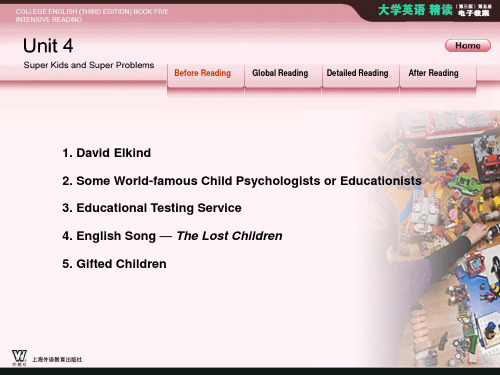
Global Reading
Detailed Reading
After Reading
1. David Elkind 2. Some World-famous Child Psychologists or Educationists 3. Educational Testing Service 4. English Song — The Lost Children 5. Gifted Children
Before Reading
Global Reading
Detailed Reading
After Reading
Paragraph Completion Directions: Listen to the recording, and then complete the following paragraph with the information you get from the passage you have just heard. As a ________ nonprofit organization, Educational Testing Service was founded in 1947 ____ by three different governmental committees or non-governmental ones, namely the American Council on Education, the Carnegie Foundation for ___ the Advancement of Teaching , and the College Entrance Examination Board. ETS ______________________ is aiming at helping ______________________ advance quality and equity in education by providing research, services, and assessments, which should be ___________ fair and valid . ETS has lots of sections with distinctive purposes or missions. Lots of measurement equitable testing , and experts who specialize in research in psychometrics, ______________ assessment technology comprise one of the most important key divisions, the ETS Statistics and Research Division . _________________________________
大学英语精读说课稿

大学英语精读说课稿各位专家,各位老师大家好!今天我所说的课程是我院人文社科系高职商务英语专业的《大学英语精读》课程,大学英语精读(intensive reading)是大学英语中扩展英语词汇语法,提高英语阅读能力与写作能力的一种最佳方式,下面我将主要从以下四个部分说起(请看ppt)。
首先让我们来看一下第一部分教学大纲.一、教学大纲。
本部分共包括四项内容(一)制定依据:《大学英语精读》这门课程的教学应该说是建立在两个基石之上。
首先,它是一门英语专业课,它要遵循英语教学的规律与要求,融合传统与现代教学理念:强调打好扎实语言基本功,突出综合应用能力的提高。
同时,它又是在当前职业教育这个大背景下的一门课程,它又要彰显职业教育的特色。
当然,还要结合我院的实际情况。
以下这三个文件是我们制定大纲的主要依据。
(《高职高专英语课程教学基本要求》(2000年教育部出台的用于指导职业教育背景的英语教学)、16号文件(2006教育部推出的一项重要政策,对全面提高高等职业教育教学质量提出了指导方向)及我院的办学定位(培养德、智、体、美全面发展的高素质、高技能专门人才)(二)课程性质:本课程性质为郑州交通职业学院人文社科系商务英语专业高职学生专业必修课。
(三)课程定位:大学精读既是一门基础学科又是一门工具学科1. 基础中体现必要性,旨在帮助高职英语专业学生进一步打下扎实的语言基础。
基础中体现着重要性。
语法与词汇是高职英语主干课程的任务,只有基础打扎实了,才能服务于其它课程。
课时任务量每周8课时,训练时间相对宽松。
2. 工具学科要体现够用度即满足人文素质提高的基本要求我系学生专业课学习的一个辅助工具。
大学精读是学生中学英语学习与专业英语学习的一个巩固和衔接,这要求就要把学生中学时期遗留的问题一边解决一边转移的同时还要为高年级阶段开设的专业英语以及以后的学历提升做好铺垫。
工具学科需要特长培养和气氛带动,语言的精髓在于表达和交流,一个人的语言表达好坏展示一个人的精神和素质面貌。
大学英语精读教案第四册unit4
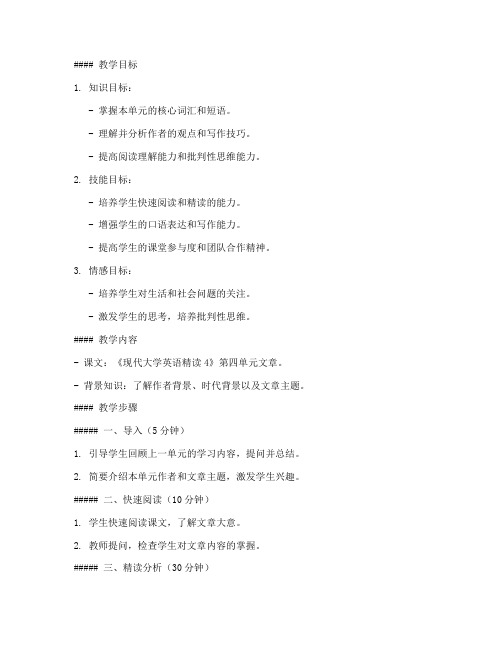
#### 教学目标1. 知识目标:- 掌握本单元的核心词汇和短语。
- 理解并分析作者的观点和写作技巧。
- 提高阅读理解能力和批判性思维能力。
2. 技能目标:- 培养学生快速阅读和精读的能力。
- 增强学生的口语表达和写作能力。
- 提高学生的课堂参与度和团队合作精神。
3. 情感目标:- 培养学生对生活和社会问题的关注。
- 激发学生的思考,培养批判性思维。
#### 教学内容- 课文:《现代大学英语精读4》第四单元文章。
- 背景知识:了解作者背景、时代背景以及文章主题。
#### 教学步骤##### 一、导入(5分钟)1. 引导学生回顾上一单元的学习内容,提问并总结。
2. 简要介绍本单元作者和文章主题,激发学生兴趣。
##### 二、快速阅读(10分钟)1. 学生快速阅读课文,了解文章大意。
2. 教师提问,检查学生对文章内容的掌握。
##### 三、精读分析(30分钟)1. 词汇学习:- 介绍本单元核心词汇和短语,如:evidently, irrespective, transcend等。
- 通过例句和语境帮助学生理解和记忆。
2. 篇章结构分析:- 分析文章的段落结构,理解作者的写作思路。
- 引导学生关注文章的主题句和结论句。
3. 观点分析:- 分析作者的观点和态度,探讨文章中的论点和论据。
- 引导学生进行批判性思考,提出自己的观点。
##### 四、课堂活动(20分钟)1. 小组讨论:- 将学生分成小组,针对文章中的某个问题进行讨论。
- 各小组代表分享讨论成果,全班共同总结。
2. 角色扮演:- 学生扮演文章中的角色,模拟情景对话。
- 培养学生的口语表达能力和团队合作精神。
##### 五、写作练习(15分钟)1. 根据文章主题,让学生写一篇短文,如:谈谈你对文章中某个观点的看法。
2. 教师批改并给予反馈。
##### 六、总结与作业(5分钟)1. 教师总结本节课的学习内容,强调重点和难点。
2. 布置课后作业,如:预习下一单元内容,阅读相关书籍等。
大学英语精读四unit5教案
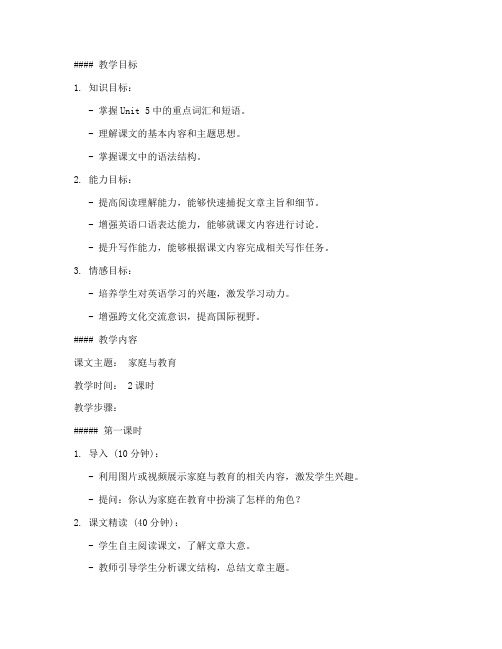
#### 教学目标1. 知识目标:- 掌握Unit 5中的重点词汇和短语。
- 理解课文的基本内容和主题思想。
- 掌握课文中的语法结构。
2. 能力目标:- 提高阅读理解能力,能够快速捕捉文章主旨和细节。
- 增强英语口语表达能力,能够就课文内容进行讨论。
- 提升写作能力,能够根据课文内容完成相关写作任务。
3. 情感目标:- 培养学生对英语学习的兴趣,激发学习动力。
- 增强跨文化交流意识,提高国际视野。
#### 教学内容课文主题:家庭与教育教学时间: 2课时教学步骤:##### 第一课时1. 导入 (10分钟):- 利用图片或视频展示家庭与教育的相关内容,激发学生兴趣。
- 提问:你认为家庭在教育中扮演了怎样的角色?2. 课文精读 (40分钟):- 学生自主阅读课文,了解文章大意。
- 教师引导学生分析课文结构,总结文章主题。
- 词汇讲解:重点讲解课文中的生词和短语,如:nurture、discipline、upbringing等。
- 语法讲解:分析课文中的语法结构,如:被动语态、非谓语动词等。
3. 课堂讨论 (20分钟):- 提问:课文中的哪些观点对你有启发?- 学生分组讨论,分享各自的观点和感受。
##### 第二课时1. 复习巩固 (10分钟):- 回顾上一节课的重点词汇和短语。
- 进行语法练习,巩固所学语法知识。
2. 口语练习 (20分钟):- 学生根据课文内容,进行角色扮演或小组讨论。
- 教师给予指导和评价。
3. 写作训练 (30分钟):- 学生根据课文内容,完成一篇短文写作。
- 教师提供写作指导,帮助学生提升写作能力。
4. 总结 (10分钟):- 回顾本节课的学习内容,总结家庭与教育的重要性。
- 布置课后作业,巩固所学知识。
#### 教学评价1. 课堂参与度:观察学生在课堂讨论、口语练习和写作训练中的表现,评价其参与度。
2. 知识掌握情况:通过课堂提问、练习和作业,了解学生对重点词汇、短语和语法知识的掌握程度。
最新现代大学英语精读5 lesson 4 Professions for Women资料讲解
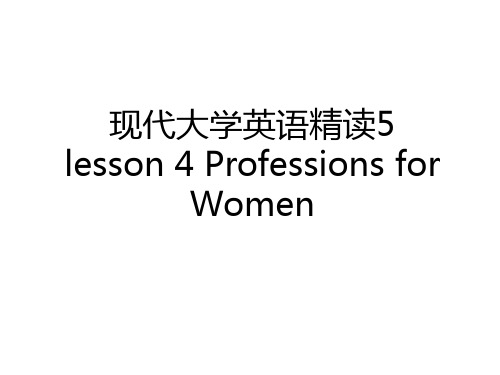
Women
Contents
1 Warm up & Preview
2
Background
3
Text Analysis
ห้องสมุดไป่ตู้
4
Extension
Contents
Warm up: sexism against women Background: Virginia Woolf; Stream of
In a survey, the percentage of women aged 15–49 who thought that a husband is justified in hitting or beating his wife under certain circumstances, was 90% in
Historically, in many patriarchal societies, women have been and are viewed as the "weaker sex". Women's lower status can be seen in cases.
•equality under the law, •political representation of women, •access to education and employment, •language •women victims of domestic violence, •self-ownership of a woman's body, •the possible impact of pornography on women
大学英语精读第二册unit5教案

课时:2课时教学目标:1. 掌握本单元的核心词汇和短语,如:civility, civilization, fortune, bewilder, statesman, housewife等。
2. 理解课文内容,掌握文章结构,提高阅读理解能力。
3. 通过课堂讨论和实践活动,提高学生的口语表达能力和团队合作能力。
教学重点:1. 核心词汇和短语的掌握。
2. 课文内容的理解。
教学难点:1. 课文中的复杂句型。
2. 文章主题的把握。
教学准备:1. 课件:课文内容、词汇、短语、练习题等。
2. 教学辅助材料:相关背景资料、图片等。
教学过程:第一课时一、导入1. 课前预习检查:了解学生对课文内容的掌握情况。
2. 介绍本单元主题:家庭与婚姻。
二、课文精读1. 词汇学习:讲解课文中的核心词汇和短语,如:civility, civilization, fortune, bewilder, statesman, housewife等。
2. 句子分析:分析课文中的复杂句型,如:复合句、并列句等。
3. 课文内容理解:引导学生阅读课文,理解文章结构,把握文章主题。
三、课堂讨论1. 讨论课文中的家庭观念和婚姻观念。
2. 学生分组讨论:针对课文中的某个观点,展开辩论。
四、实践活动1. 角色扮演:学生分组扮演课文中的角色,进行对话练习。
2. 家庭故事分享:请学生分享自己的家庭故事,增进对家庭的理解。
第二课时一、复习导入1. 复习上节课所学内容,检查学生对课文的理解程度。
2. 引导学生回顾家庭与婚姻的主题。
二、课文精读1. 词汇巩固:再次讲解本单元的核心词汇和短语,并进行练习。
2. 句子分析:引导学生分析课文中的复杂句型,提高阅读理解能力。
三、课堂讨论1. 讨论家庭与婚姻在现代社会中的地位和作用。
2. 学生分组讨论:针对家庭与婚姻的问题,提出解决方案。
四、实践活动1. 家庭关系模拟:学生分组模拟家庭关系,进行角色扮演。
2. 家庭价值观讨论:引导学生思考自己的家庭价值观,并进行分享。
大学英语精读5电子教案

课时安排:2课时教学目标:1. 掌握课文中的关键词汇、短语和常用句型。
2. 理解课文结构,分析作者的观点和论证过程。
3. 培养学生的阅读理解能力和英语写作技巧。
教学内容:1. 课文概述2. 词汇与短语讲解3. 句型分析4. 语法讲解5. 阅读理解练习6. 写作技巧训练教学步骤:一、导入新课(10分钟)1. 复习上一课的内容,检查学生的掌握情况。
2. 介绍本课的主题和作者,激发学生的学习兴趣。
二、课文概述(15分钟)1. 让学生阅读课文,了解文章大意。
2. 讲解课文背景,帮助学生更好地理解文章内容。
三、词汇与短语讲解(20分钟)1. 列出课文中的关键词汇和短语,让学生翻译并解释其含义。
2. 通过例句讲解词汇和短语的使用方法,帮助学生掌握其用法。
四、句型分析(15分钟)1. 分析课文中的常用句型,讲解其结构特点。
2. 让学生举例说明句型的使用方法,巩固所学知识。
五、语法讲解(15分钟)1. 针对课文中的语法点进行讲解,如时态、语态、非谓语动词等。
2. 通过例句讲解语法规则,帮助学生掌握语法知识。
六、阅读理解练习(15分钟)1. 设计阅读理解练习,让学生在规定时间内完成。
2. 讲解练习答案,帮助学生分析错误原因,提高阅读理解能力。
七、写作技巧训练(15分钟)1. 讲解英语写作的基本技巧,如文章结构、段落划分、过渡词等。
2. 让学生根据所学知识,完成一篇短文写作。
八、课堂小结(10分钟)1. 总结本课所学内容,强调重点和难点。
2. 鼓励学生在课后复习,巩固所学知识。
教学评价:1. 课堂参与度:观察学生在课堂上的表现,了解其对知识的掌握程度。
2. 阅读理解练习:通过学生的练习答案,评估其阅读理解能力。
3. 写作练习:根据学生的写作水平,评价其写作技巧的提高。
教学反思:1. 教师应根据学生的实际情况,调整教学内容和方法。
2. 注重培养学生的自主学习能力,提高学生的英语水平。
3. 加强课堂互动,激发学生的学习兴趣,提高教学效果。
大学精读英语4教案

教学目标:1. 让学生掌握本单元的词汇和短语。
2. 提高学生的阅读理解能力。
3. 培养学生的口语表达能力。
4. 培养学生对自然环境的热爱和保护意识。
教学时间:2课时教学对象:大学本科英语专业学生教学准备:1. 教材:《大学英语精读4》2. PPT课件3. 录音材料4. 白板、粉笔教学过程:第一课时:一、导入1. 通过图片或视频展示自然环境的美,激发学生对自然环境的兴趣。
2. 提问:你们对自然环境有什么样的感受?你们喜欢亲近大自然吗?二、阅读课文1. 学生自主阅读课文,了解课文大意。
2. 教师提问,检查学生对课文的理解程度。
三、词汇讲解1. 教师讲解课文中的重点词汇和短语,如:woods、bushes、clearing、deer、solitude等。
2. 学生跟读,加深对词汇的记忆。
四、课文分析1. 分析课文结构,了解作者的写作思路。
2. 分析作者对自然环境的描述,体会作者的情感。
五、讨论1. 学生分组讨论,谈谈自己对课文的理解和感受。
2. 各组代表发言,分享讨论成果。
第二课时:一、复习1. 复习上一节课的词汇和短语。
2. 学生默写课文中的重点词汇。
二、口语练习1. 学生根据课文内容,用英语进行角色扮演。
2. 教师指导,纠正学生的发音和语法错误。
三、写作练习1. 学生根据课文内容,写一篇关于自己亲近自然经历的短文。
2. 教师批改,指出学生的优点和不足。
四、总结1. 教师总结本节课的学习内容,强调课文中的重点词汇和短语。
2. 学生分享自己的学习心得。
教学反思:本节课通过阅读、讨论、口语和写作等多种形式,帮助学生掌握课文内容,提高英语综合运用能力。
在教学过程中,教师应关注学生的个体差异,针对不同学生的学习需求进行个性化指导。
同时,注重培养学生的环保意识,引导他们热爱大自然,保护自然环境。
大学英语精读4unit4电子教案
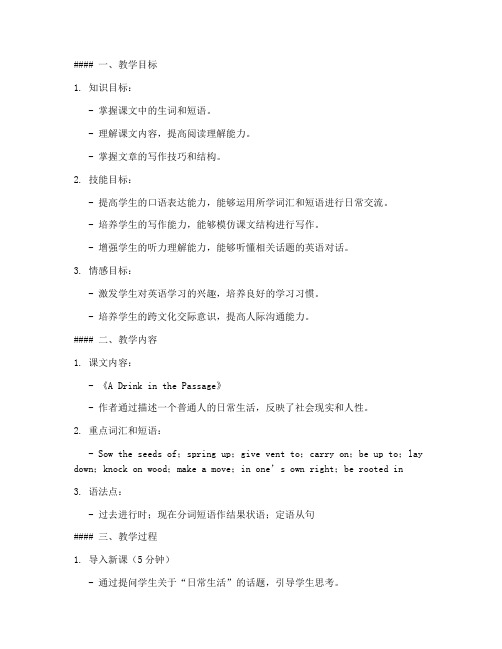
#### 一、教学目标1. 知识目标:- 掌握课文中的生词和短语。
- 理解课文内容,提高阅读理解能力。
- 掌握文章的写作技巧和结构。
2. 技能目标:- 提高学生的口语表达能力,能够运用所学词汇和短语进行日常交流。
- 培养学生的写作能力,能够模仿课文结构进行写作。
- 增强学生的听力理解能力,能够听懂相关话题的英语对话。
3. 情感目标:- 激发学生对英语学习的兴趣,培养良好的学习习惯。
- 培养学生的跨文化交际意识,提高人际沟通能力。
#### 二、教学内容1. 课文内容:- 《A Drink in the Passage》- 作者通过描述一个普通人的日常生活,反映了社会现实和人性。
2. 重点词汇和短语:- Sow the seeds of;spring up;give vent to;carry on;be up to;lay down;knock on wood;make a move;in one’s own right;be rooted in3. 语法点:- 过去进行时;现在分词短语作结果状语;定语从句#### 三、教学过程1. 导入新课(5分钟)- 通过提问学生关于“日常生活”的话题,引导学生思考。
- 引出课文主题,激发学生的兴趣。
2. 课文阅读(15分钟)- 让学生快速阅读课文,了解大意。
- 引导学生找出课文中生词和短语,并进行讲解。
- 分析文章结构,讲解写作技巧。
3. 词汇和短语学习(10分钟)- 重点讲解生词和短语,让学生进行造句练习。
- 鼓励学生运用所学词汇和短语进行口语交流。
4. 语法点讲解(10分钟)- 讲解过去进行时和现在分词短语作结果状语等语法点。
- 通过例句让学生理解和运用。
5. 练习环节(15分钟)- 进行听力练习,提高学生的听力理解能力。
- 进行写作练习,让学生模仿课文结构进行写作。
6. 总结与反馈(5分钟)- 对本节课的学习内容进行总结。
- 收集学生的反馈意见,为今后的教学提供参考。
大学英语精读第五册教案
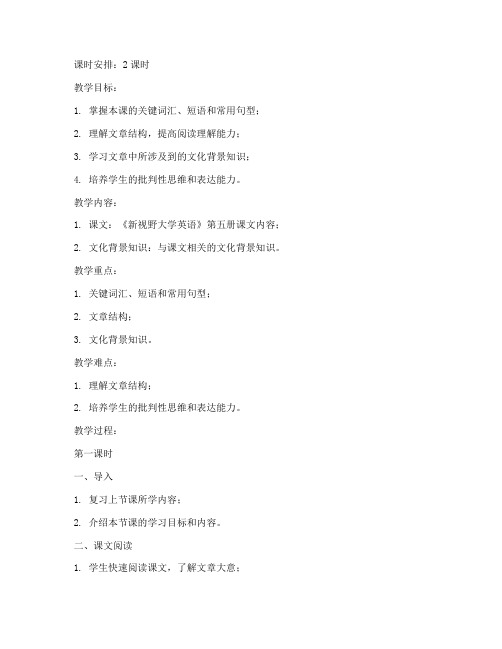
课时安排:2课时教学目标:1. 掌握本课的关键词汇、短语和常用句型;2. 理解文章结构,提高阅读理解能力;3. 学习文章中所涉及到的文化背景知识;4. 培养学生的批判性思维和表达能力。
教学内容:1. 课文:《新视野大学英语》第五册课文内容;2. 文化背景知识:与课文相关的文化背景知识。
教学重点:1. 关键词汇、短语和常用句型;2. 文章结构;3. 文化背景知识。
教学难点:1. 理解文章结构;2. 培养学生的批判性思维和表达能力。
教学过程:第一课时一、导入1. 复习上节课所学内容;2. 介绍本节课的学习目标和内容。
二、课文阅读1. 学生快速阅读课文,了解文章大意;2. 教师提问,检查学生对文章内容的理解;3. 学生细读课文,找出关键词汇、短语和常用句型;4. 教师讲解课文中的重点词汇、短语和常用句型。
三、文化背景知识1. 教师介绍与课文相关的文化背景知识;2. 学生讨论,加深对文化背景知识的理解。
四、课堂小结1. 教师总结本节课所学内容;2. 学生回顾所学内容,提出疑问。
第二课时一、复习1. 学生回顾上节课所学内容;2. 教师提问,检查学生对文章内容的理解。
二、课文分析1. 学生分析课文结构,找出文章的主题和论点;2. 教师讲解课文结构,帮助学生理解文章的逻辑关系。
三、讨论1. 学生围绕课文内容展开讨论,发表自己的观点;2. 教师引导学生进行批判性思考,培养学生的表达能力。
四、课堂小结1. 教师总结本节课所学内容;2. 学生回顾所学内容,提出疑问。
教学评价:1. 学生在课堂上的参与度和积极性;2. 学生对关键词汇、短语和常用句型的掌握程度;3. 学生对文章结构的理解程度;4. 学生在讨论中的批判性思维和表达能力。
教学反思:1. 教师应根据学生的实际情况调整教学方法和进度;2. 注重培养学生的阅读理解能力和批判性思维能力;3. 结合课文内容,拓宽学生的文化视野。
大学英语精读第二册UnitFive讲解
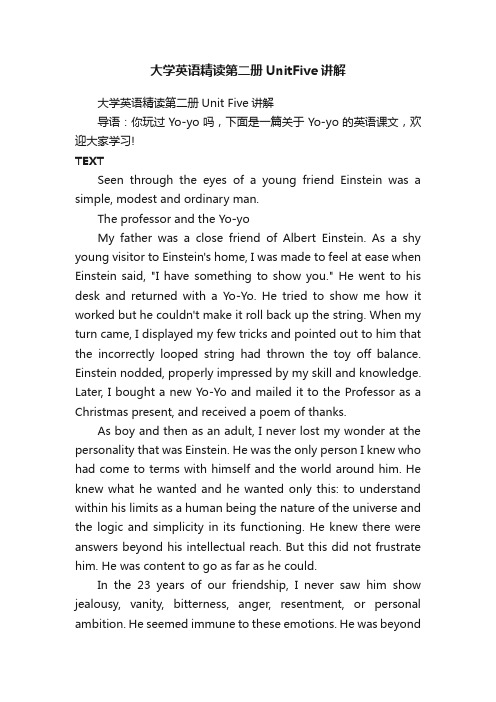
大学英语精读第二册UnitFive讲解大学英语精读第二册Unit Five讲解导语:你玩过Yo-yo吗,下面是一篇关于Yo-yo的英语课文,欢迎大家学习!TEXTSeen through the eyes of a young friend Einstein was a simple, modest and ordinary man.The professor and the Yo-yoMy father was a close friend of Albert Einstein. As a shy young visitor to Einstein's home, I was made to feel at ease when Einstein said, "I have something to show you." He went to his desk and returned with a Yo-Yo. He tried to show me how it worked but he couldn't make it roll back up the string. When my turn came, I displayed my few tricks and pointed out to him that the incorrectly looped string had thrown the toy off balance. Einstein nodded, properly impressed by my skill and knowledge. Later, I bought a new Yo-Yo and mailed it to the Professor as a Christmas present, and received a poem of thanks.As boy and then as an adult, I never lost my wonder at the personality that was Einstein. He was the only person I knew who had come to terms with himself and the world around him. He knew what he wanted and he wanted only this: to understand within his limits as a human being the nature of the universe and the logic and simplicity in its functioning. He knew there were answers beyond his intellectual reach. But this did not frustrate him. He was content to go as far as he could.In the 23 years of our friendship, I never saw him show jealousy, vanity, bitterness, anger, resentment, or personal ambition. He seemed immune to these emotions. He was beyondany pretension. Although he corresponded with many of the world's most important people, his stationery carried only a watermark - W - for Woolworth's.To do his work he needed only a pencil only a pencil and a pad of paper. Material things meant nothing to him. I never knew him to carry money because he never had any use for it. He believed in simplicity, so much so that he used only a safety razor and water to shave. When I suggested that he try shaving cream, he said, "The razor and water do the job.""But Professor, why don't you try the cream just once?" I argued. "It makes shaving smoother and less painful."He shrugged. Finally, I presented him with a tube of shaving cream. The next morning when he came down to breakfast, he was beaming with the pleasure of a new, great discovery. "You know, that cream really works," he announced. "It doesn't pull the beard. It feels wonderful." Thereafter, he used the shaving cream every morning until the tube was empty. Then he reverted to using plain water.Einstein was purely and exclusively a theorist. He didn't have the slightest interest in the practical application of his ideas and theories. His E=mc2 is probably the most famous equation in history - yet Einstein wouldn't walk down the street to see a reactor create atomic energy. He won the Nobel Prize for his Photoelectric Theory, a series of equations that he considered relatively minor in importance, but he didn't have any curiosity in observing how his theory made TV possible.My brother once gave the Professor a toy, a bird that balanced on the edge of a bowl of water and repeatedly dunked its head in the water. Einstein watched it in delight, trying to deduce the operating principle. But be couldn't.The next morning he announced, "I had thought about that bird for a long time before I went to bed and it must work this way…" He began a ling explanation. Then he stopped, realizing a flaw in his reasoning. "No, I guess that's not it," he said. He pursued various theories for several days until I suggested we take the toy apart to see how it did work. His quick expression of disapproval told me he did not agree with this practical approach. He never did work out the solution.Another puzzle that Einstein could never understand was his own fame. He had developed theories that were profound and capable of exciting relatively few scientists. Yet his name was a household word across the civilized world. "I've had good ideas, and so have other men," he once said. "But it's been my good fortune that my ideas have been accepted." He was bewildered by his fame: people wanted to meet him; strangers stared at him on the street; scientists, statesmen, students, and housewives wrote him letters. He never could understand why he received this attention, why he was singled out as something special. NEW WORDSmodesta. having or expressing a not too high opinion of one's merits, abilities, etc. 谦虚的yo-yon. 游游(一种用线扯动使用权忽上忽来的轮形玩具)easen. freedom from work, discomfort, trouble, difficulty, worry, etc. 悠闲;舒适;自在;安心displayn. show 展示loopvt. 把(绳等)打成环n. 圈;环strongn. 细绳;线;弦balancen. condition of being steady 平衡v. keep in a state of balanceproperlyad. really; completely 非常;完全地impressvt. have a strong effect on the mind or feelings of 给...深刻的印象mailvt. send by postpoemn. piece of writing in verse 诗personalityn. character 个性logicn. the science or method of reasoning 逻辑(学);推理(法)simplicityn. the state of being simple; an absence of pretense 简单;简朴;单纯functionvi. workintellectuala. 智力的frustraten. cause to have feeling of annoyed disappointment; defeat 使沮丧;挫败frustrationn.jealousyn. envy 妒忌jealousa.vanityn. state of being too proud of oneself or one's looks, abilities, etc. 虚荣心bitternessn. the quality or state of being bitter 苦;痛苦resentmentn. feeling that one has when insulted, ignored, injured, etc. 怨恨ambitionn. strong desire for success, power, riches, etc. 野心,抱负ambitiousa.immunea. 有免疫力的;不受影响的immunityn.emotionn. strong feelingpretensionn. 矫饰,做作,不受影响correspondvi. exchange letter regularly 通信stationeryn. paper for writing letters, usu. with matching envelopes;writing materials 信笺;文具watermarkn. mark made on paper by the maker, seen when it is held against light 水印padn. a number of sheets of writing paper fixed along one edge 便笺簿razorn. sharp instrument for taking hair off the body 剃刀shavevt. cut off (hair or beard) with a razorcreamn. any thick, soft liquid 膏状物arguevt. give reasons for or against (sth.) 争辨painfula. causing painshrugvi. lift (the shoulders) slightly (to show in difference, doubt, etc.) 耸肩finallyad. at last; lastly 最终;最后presentvt. give; offer 赠送;提供tuben. 管;软管beamvi. look or smile happily and cheerfully 面露喜色;高兴地微笑beardn. hair of the lower part of the face (excluding the moustache)胡须thereafterad. after that; afterwardsrevertvi return (to a former state, condition, etc.) 回复,回返exclusivelyad. only; completelyexclusivea. person who forms theories 理论家。
大学英语精读四电子教案

课程名称:大学英语精读四授课对象:大学本科英语专业学生授课时间:2课时教学目标:1. 理解课文主题,提高学生的阅读理解能力。
2. 学习并掌握课文中的重点词汇和语法结构。
3. 培养学生的批判性思维和表达能力。
教学内容:1. 课文:《Spring Sowing》2. 重点词汇:spring, sowing, reap, barren, fertile3. 语法结构:现在分词作状语,过去分词作定语教学过程:第一课时1. 导入新课(10分钟)- 提问:What do you know about the author, Liam O'Flaherty? - 简要介绍作者背景,激发学生对课文的好奇心。
2. 课文精读(30分钟)- 阅读课文,要求学生注意理解文章的主旨和段落大意。
- 分析课文中的重点词汇和语法结构,引导学生进行翻译和造句。
- 讨论课文中的难点,如现在分词作状语,过去分词作定语等。
3. 课堂练习(20分钟)- 划分小组,进行词汇和语法练习。
- 针对课文内容,进行问答和讨论。
第二课时1. 复习上节课内容(10分钟)- 复习重点词汇和语法结构,巩固学习成果。
2. 课文拓展(30分钟)- 引导学生思考课文主题,探讨与课文相关的话题。
- 例如:如何克服困难,实现自己的目标?- 鼓励学生发表自己的观点,培养学生的批判性思维。
3. 课堂讨论(20分钟)- 针对课文内容,进行小组讨论,分享学习心得。
- 鼓励学生运用所学知识,进行口头表达。
4. 总结与作业布置(10分钟)- 总结本节课的学习内容,强调重点。
- 布置课后作业,如:- 复习课文,翻译并背诵重点段落。
- 撰写一篇关于课文主题的短文。
教学方法:1. 讲授法:讲解重点词汇和语法结构。
2. 讨论法:引导学生进行课堂讨论,培养学生的批判性思维。
3. 练习法:通过课堂练习,巩固学习成果。
教学评价:1. 课堂参与度:观察学生在课堂上的发言情况,评价其学习积极性。
最新lesson 1 现代大学英语精读5 第二版讲课稿

• Why do the administrators fear the students?
• What has the author learnt from Emerson and Freud respectively?
Part VIII (Paras. 35-38)
• What attitude should the students hold towards those famous writers?
Part III (Paras. 5-7)
• What is his father’s reaction to the author’s plan to major in law in college?
• How about your parents’ opinions towards your major?
• 第一个题目作文号:482680, Reflection over the BBC Documentary.
• 第二个题目作文号:482682 My View on the Problems of College Education in China.
• You can revise your essay as many times as you like and you have to print the one you are satisfied with and hand in it to me before the National Day Holiday.
大学英语精读05-06-1 B SJ

班级: 姓名: 学号: .密封线内禁止答题基础英语精读 考试B 卷第 1 页 共 3 页 2005-12-18南 京 信 息 职 业 技 术 学 院 试 卷 2005 /2006学年第_1_学期期末考试B 卷课程名称: 基础英语精读 考试时间:100分钟 命题人 李鹏 05 年 12 月 18 日 审批人 05 年 12月 18 日 使用班级00411P,00412P,30433S,30434S 考试成绩:Part ⅠFill in the gaps with words or phrases chosen from the following box. Change the formwhere necessary. (10 minutes )1. It ’s dangerous to swim in the river here because the_______________ is so strong.2. If you are aged over 18 and______________, it’s safe to take the medicine.3. Plastics can be made hard as stone, strong as steel, ______________ as glass, light as wood,and elastic as rubber.4. Coat the shoes with polish, then______________ hard with a soft cloth to give a shine.5. We are waiting for his challenge. If he______________ it, it will only confirm that he isthe crowd we think he is.6. You can get a loan for essential household equipment such as a cooker and aheating______________.7. Conventional medicine has concentrated mainly on the treatment of chronic and acute illness,and until recent years the role of preventive medicine has suffered______________ neglect. 8. You should remember that a fridge doesn ’t kill bacteria; it only slows down the rate atwhich they____________.9. When asked to do us a favor by showing us around the city, Jack said he was only too happyto______________.10. The town has been producing wool, cloth, and blankets since 13thcentury and much ofits______________ today is still found on those industries.11. Many people prefer to go______________ and camp in the county rather than travel by car.They believe this gets them closer to the nature.12. I think she raised a very important and______________ question at the discussion that shouldbe answered before we moved ahead.13. The trouble with many______________ is that, unlike adults, they are too shy to discusstheir problems.14. Nowadays it is common practice for conference participants to wear name______________ soas to get to know each other easier.15. The poet______________ both historical events and imaginative elements into his poems. Part Ⅱ Complete the following, using the words and phrases in bracket. Make additions and changes where necessary: (5 minutes) 16. Mary gave me__________________ reply via email; ______________ she wouldn ’t be able toaccept my invitation. I__________________ disappointed. (evidently, definite, trifle) 17. There is____________ evidence showing that in the eleventh and twelfth villages, in almostevery corner of Europe the area under the plough was expanding, villages were __________________, new landswere being colonized, and_____________________ of Europe were being pressed forwards and outwards.(spring up, frontier, abundance)18. When he finished________________, Sterling would look at himself in the mirror again,______________ chin with hand. Then he would sit on a sofa_________________ a cup of tea.(stroke, shave, sip)19. It takes_____________ to realize how these ordinary working women skillfully_____________such beautiful______________ patterns in fabrics.(unusual, imagination, weave)20. Thousands of people_____________ the East Lake yesterday to watch_______________ boat racebetween the world champions who_______________ their boats like mad. Part Ⅲ Reading Comprehension:(25 minutes)1A teenager in 1972, Bill Gates said he would be a millionaire by the time he was 20. While he did not quite achieve that goal, only 15 years later, he was a billionaire. And by 1992, he became the richest man in America with a wealth of about US$6.3 billion.Born in Seattle, Washington, on 28 October, 1956, Gates was named William after his father and grandfather. From the beginning, he was an extremely energetic and intelligent child. He had read the entire World Book Encyclopedia by the age of nine. His favorite subjects at school were science and mathematics and his favorite hobby was “thinking ”.But although he was clever, his social skills were not as good. He was a year younger than most of his classmates and small for his age. The skinny, left-handed boy with big feet and a squeaky voice was often the object of jokes and found himself treated as an outsider by his classmates.If being laughed at bothered young Bill, however, he didn ’t show it. While other children密封线内禁止答题were outside enjoy playing games and enjoying sport, Bill spent all his time writing essays or reading his favorite books. When asked what he wanted to be when he grew up, 11-year-old Bill said, “A scientist ”.Gates first started to play with computers at the age of 13, when one was installed at his school. At that time, computers were large, awkward machines. Users were required to learn complex computer languages before the machines could be used. Even then, a great deal of time and effort was needed to perform the simplest functions. Before long, Gates was an expert at working the school ’s computer. Along with a group of older students, who had a similar interestin the awkward machine, he set about learning every computer language and function there was. Eventually, in order to spend more time at the computer, Gates agreed to help develop computerized class schedules for the school. It was a project that would take all of his years in secondaryschool to complete.Choose the best answer for each of the following questions. 21. When did Bill Gates first become a billionaire?A. When he was 15 years old.B. When he was 35 years old.C. In 1992.D. In 1987.22. What does the author imply when he said that Gates had read the entire World Book Encyclopediaby the age of nine?A. Gates had a good memory.B. Reading was Gates ’ favorite hobby.C. Not many nine-year-old boys could do it.D. The book was popular among the nine-year-olds23. Compared with most other school children of the same age, young Bill was____________.A. shortB. tallC. fatD. left-handed24. Bill and a group of older students set about learning every computer language and functionbecause___________?A. computers were large, awkward machines thenB. they all liked working with computersC. it was difficult to learn to work with computersD. they had the same interests and hobbies25. Gates helped develop computerized class schedules for the school because___________.A. he hoped that he could spend more time at the computerB. he wanted to earn some moneyC. he hoped to be awarded a prize by the schoolD. he knew the project would last many years2Some people are born with the belief that they are masters of their lives. Others feel that they are at the mercy of fate.New research shows that parts of those feelings are in the genes.Psychologists have long known that people confident in their ability to control their fate are more likely to adjust well to growing old than those who feel that they drift on the currents of fate.Two researchers who questioned hundreds of Swedish twins report that such confidence, or lack of it, is partly inborn and partly drawn from experience.They also found that the belief in blind luck---a belief that chance plays a big role in life---is something learned from life and has nothing to do with heredity.The research was conducted at the Karolinska Institute---better known as the body that annually awards the Nobel Prize for medicine by Nancy Pedersen of the Institute and Margaret Gatz, a professor at the University of Southern California in Los Angeles. Their results were recently published in the United States in the Journal of Gerontology .People who are confident of their ability to control their lives have an “internal power of control ”, and have a better chance of being well adjusted in their old age, said Pedersen. An “external power of control,” believing that outside forces determine the course of life, has been linked to depression in later years, she said.“We are trying to understand what makes people different. What make some people age gracefully and others have a more difficult time?” she said.The study showed that while people have an inborn tendency toward independence and self-confidence, about 70 percent of this personality is affected by a person ’s environment and lifetime experiences.Pedersen ’s studies investigated the aging process by comparing sets of twins, many of whom were separated at an early age.The subjects were drawn from a list made about 30 years ago registering all twins born in Sweden since 1886. The complete list has 95,000 sets of twins.26. According to the new research, confidence comes from_______________.A. the currents of one ’s fateB. one ’s ability to control one ’s life密封线内禁止答题C. the external power of controlD. one ’s genes and lifetime experiences 27. People confident in their ability can__________.A. determine their own course of lifeB. let fate determine their own course of lifeC. win a Noble PrizeD. stay healthy until a very old age 28. People who lack confidence____________.A. do not lead a happy lifeB. can be masters of their own livesC. think chance is important in their own livesD. both B and C29. Which of the following statement is true?A. Heredity and lifetime experiences play an equal role in gaining confidence.B. Environment and lifetime experiences play an important role in building confidence.C. People confident of their ability will never suffer from depression.D. People who lack confidence can have a good time when they are old.30. The passage mainly tells us that___________.A. if people are confident, they are masters of their livesB. if people are not confident, they never lead happy livesC. about 70 percent of one ’s confidence is affected by environmentD. confidence is partly inborn and partly learned later in lifePart Ⅳ Rewrite or complete the following sentences according to the required sentence structures: (10 minutes) 31. One of the oldest human needs is having someone________________ you have been when you don ’tcome home at night.(Completing the sentences after the models, with the structure “wonder if/what/how …”.) 32. George had to abandon his ambitious plan to set up a research center because it was impossiblefor him to_____________________________________________________.(Complete the sentence using “start/get/have/set …sb. doing …”and the words given inbracket.)33. No one dares to go out after dark now.(without fear of being mugged, walk around the town,at night, be able, we)_______________________________________________________________ (Develop the sentence with “used to ” and the given words in brackets.)34. ____________________________________(如果你恰巧经过面包店), pick me up a brown loaf.(Complete the sentence using “It happens that …”.)35. Since we can fix it by ourselves, why should we call for a repairman?Why pay a repairman_________________________________? (for nothing) (Rewrite the sentence with the phrase in bracket, keeping the same meaning.)Part Ⅴ Translate the following sentences into English, using the words and phrases given below:(10 minutes)36. 虽然我们没有见到任何壮观的景物, 我们享受了在这个远离大城市喧嚣的镇里度过的每一分钟。
- 1、下载文档前请自行甄别文档内容的完整性,平台不提供额外的编辑、内容补充、找答案等附加服务。
- 2、"仅部分预览"的文档,不可在线预览部分如存在完整性等问题,可反馈申请退款(可完整预览的文档不适用该条件!)。
- 3、如文档侵犯您的权益,请联系客服反馈,我们会尽快为您处理(人工客服工作时间:9:00-18:30)。
大学英语精读05-06(04)期中试卷南 京 信 息 职 业 技 术 学 院 试 卷2005 /2006学年第_1_学期 期中考试A 卷课程名称: 基础英语精读 考试时间:100分钟命题人 赵小云 05 年 10 月 1 日审批人 年 月 日使用班级: 00411P, 00412P, 30433S, 30434S 考试成绩:Part ⅠFill in the gaps with words or phrases chosen from the following box. Changethe form where necessary.(8 minutes )1. She was _______________ her opponents throughout the race, but only overtook them at the very end.2. The car knocked him ______________ and he fell down on the ground.3. Severe vitamin and mineral deficiencies can lead to mental ______________.4. The two countries continued to have difficulties reaching a ______________ on asolution to the problem of acid rain.5. Dell sells its products directly to customers through the Internet and mail order______________ rather than through retail outlets.6. Industrial plants processed the ______________ material into finished productsfor export and for domestic consumption.7. The precise number of ______________ in yesterday ’s bomb explosion is not known.8. In the 1970s we had a ______________ diet of rice and vegetables.9. The research has confirmed that tobacco smoke presents a ______________ to health. 10. Under heat the metal undergoes considerable ______________. 11. The division commander ______________ that the pathfinders might get lost because of poor visibility. 12. At the beginning of the race, the runners were ______________ together on thetrack, but later some of them got ahead and left the others behind. 13. The budget speech contains a general review of economic conditions and______________ the fiscal policies that the government advocates.14. The Smiths have always wanted their children to become warm-hearted human beingswho reach out ______________ to those in need.15. The snake______________ tightly around the deer until it was dead and began todevour it.Part Ⅱ Complete the following, using the words or phrases in brackets. Makeadditions or changes where necessary.(2 minutes)16. In the ______________ clean up the river before ______________set for thisimportant municipal project, the project manager has tried every possible means to ______________ the best engineering for the work. (go, endeavor, deadline) 17. John was born ______________. Even after repeated ______________, he still walkswith a tilt. (surgery, cripple)Part Ⅲ Choose the best answer for each of the following: (10 minutes) 18. Please wait outside for a moment; the manager is______________ the phone.A. atB. toC. onD. in19. UN peacekeeping forces are expected to take______________ positions along theAfghanistan border.A. forB. upC. toD. in20.The journalist David Rorvik wrote a true story of a billionaire’s quest toproduce a son identical ______________ himself.A. withB. forC. toD. as21.We are utterly opposed ______________ any form of terrorism.A. inB. atC. toD. with22.The president refused to comment ______________ the issue of gun violence oncampus.A. onB. atC. toD. in23.John saved Mike ______________ the cost of his own life.A. withB. forC. atD. through24.Our plan are still ______________ the air.A. duringB. atC. onD. in25.The manager alerted the students ______________ the crisis facing the company.A. duringB. atC. ofD. to26.He read the paper several times but he still ______________ some printer’serrors.A. ignoredB. overlookedC. noticedD. outlined27.When the airplane takes off, the passengers are told to ______________ theirseat belts.A. fastenB. fountainC. fixD. tight28.The manager suddenly fell ill, and I’ve had to take ______________.A. overB. placeC. inD. up29.Elizabeth made careful preparations for the interview and her effortspaid______________.A. forB. byC. toD. off30.The key ______________ tomorrow’s “smart cars” will be sensors.A. inB. forC. atD. to31.The transportation system will thus gain substantial benefits______________the revolution in information technology.A. atB. fromC. ofD. to32.It made ______________ to me, typing in a hospital.A. ofB. fromC. senseD.up33.If those cells think you are different ______________ them, they will attack.A. fromB. toC. asD. with34.This blood test will show whether or not you’re immune ______________the disease.A. withB. aboutC. inD. to35.I certainly don’t subscribe ______________ the view that whatever technologypermits us to do we ought to do.A. inB. ofC. atD. to36.The man gave ______________ and offered Porter a section of the city that nosalesman wanted.A. upB. outC. offD. in37.Jack ______________ a twisted knee and couldn’t play in the final game.A. laid up withB. was laid up withC. laid offD. was laid offPart Ⅳ Reading Comprehension: (35 minutes)The stone Age was a period of history which began in approximately 2 million B. C. and lasted until 3000 B. C. Its name was derived from the stone tools and weapons that modern scientist found. This period was divided into the Paleolithic, Mesolithic, and Neolithic Ages. During the first period, (2million to 8000 B. C. ) the fist hatchet and use of fire for heating and cooking were developed. As aresult of the Ice Age, which evolved about 1 million years into the Paleolithic Age, people were forced to seek shelter in caves, wear clothing, and develop new tools.During the Mesolithic Age (8000 to 6000 B. C. ) people made crude pottery and the first fish hooks, took dogs hunting, and developed a bow and arrow, which was used until the fourteenth century A. D..The Neolithic Age (6000 to 3000 B. C.) saw humankind domesticating sheep, goats, pigs, and cattle, being less nomadic than in previous eras, established permanent settlements, and creating governments.38. How many periods was the Stone Age divided into?A. 2B. 3C. 4D. 539. Which of the following was developed earliest?A. the fish hook.B. the fist hatchetC. the bow and arrowD. pottery40. Which of the following developments is not related to the conditions of the Ice Age?A. farmingB. clothingC. living indoorsD. using fire41. Which period lasted longest?A. PaleolithicB. Ice AgeC. MesolithicD. Neolithic42. Which of the following periods saw people develop a more communal form of living?A. PaleolithicB. Ice AgeC. MesolithicD. NeolithicNapoleon Bonaparte’s ambition to control all the area around the Mediterranean Sea led him and his French soldiers to Egypt. After losing a naval battle, they were forced to remain there for three years. In 1799, while constructing a fort, a soldier discovered a piece of stele (stone pillar bearing an inscription) known as the Rosetta stone. This famous stone, which would eventually lead to the deciphering of ancient Egyptian hieroglyphics dating to 3100 B. C.. was written in three languages: hieroglyphics (picture writing), demotic ( a short-hand version of hieroglyphics), and Greek. Scientist discovered that the characters, unlike those in English, could be written from right to left and in other directions as well.Twenty-three years after discovery of the Rosetta stone, Jean Francois Champollion, a French Philologist, fluent in several languages, was able to decipher the first word-Ptolemy-name of an Egyptian ruler. This name was written inside an oval called a “cartouche”. Further investigation revealed that cartouches contained names of important people of that period. Champollion painstakingly continued his search and was able to increase his growing list of known phonetic signs. He and an Englishman, Thomas Young, worked independently of each other to unravel the deeply hidden mysteries of this strange language. Young believed that sound values could be assigned to the symbols, while Champollion insisted that the pictures represented words.43. How many years elapsed between the date of the oldest hieroglyphics deciphered by means of the Rosetta stone and the stone’s discovery?A. 1,301B. 1,799C. 3,100D. 4,89944. Which of the following languages was not written on the Rosetta stone?A. FrenchB. demoticC. GreekD. hieroglyphics45. Which of the following statements is not true?A.Cartouches contained names of prominent people of the period.B.Champollion and Young worked together in an attempt to decipher the hieroglyphics.C.One of Napoleon’s soldiers discovered the Rosetta stone.D.Thomas Young believed that sound values could be assigned to the symbols.46. When was the first word from the Rosetta stone deciphered?A. 3100B.C. B. 1766C. 1799D. 182247. What was the first word that was deciphered from the Rosetta stone?A. cartoucheB. PtolemyC. DemoticD. ChampollionAt sixteen Ron Mackie might have stayed at school, but the future called to him excitedly. “Get out of the classroom into a job,” it said, and Ron obeyed. His father, supporting the decision, found a place for him in a supermarket. “You’re lucky, Ron,” he said. “For every boy with a job these days, there’s a dozen without.” So Ron joined the working world at twenty pounds a week.For a year he spent his days filling shelves with tins of food. By the end of that time he was looking back on his school-days as a time of great variety and satisfaction. He searched for an interest in his work, with little success.One fine day instead of going to work Ron got a lift on a lorry going south. With nine pounds in his pocket, a full heart and a great longing for the sea, he set out to make a better way for himself. That evening, in Bournemouth, he had a sandwich and a drink in a café run by an elderly man and his wife. Before he had finished the sandwich, the woman had taken him on for the rest of the summer, at twentypounds a week, a room upstairs and three meals a day. At quiet times Ron had to check the old man’sarithmetic in the records of the business.At the end of the season, he stayed on the coast. He was again surprised how straightforward it was for a boy of seventeen to make a living. He worked in shops mostly, but once he took a job in hotel for three weeks. Later in October he was taken on by the sick manager of a shoe shop. Ron soon found himself in charge there; he was the only one who could keep the books.48. Why did Ron Mackie leave school at sixteen?A.His father made him leave.B.He had reached the age when he had to leave.C.He left because he was worried about the future.D.He left because he wanted to start work.49. What did Ron’s father think about his leaving school?A.He thought his son was doing the right thing.B.He advised him to stay at school to complete his education.C.He did not like the idea, but he helped Ron to find work.D.He knew there was a job for every boy who wanted one.50. It took about a year for Ron to realize thatA.he worked well because he was interested in the job.B.his work at the supermarket was dull.C.being at work was much better than going to school.D.the store manager wanted to get rid of him.51. Why did Ron leave the supermarket?A.He knew he would find work in Bournemouth.B.He took a job as a lorry driver.C.He gave up the job because he felt unwell.D.He wanted to work at the seaside.52. Ron was able to take over the shoe shop becauseA.he got on well with the manager there.B.he knew how to keep the accounts of the business.C.he had had experience of selling books.D.he was young and strong.The advantages and disadvantages of a large population have long been a subject of discussion among economist. It had been argued that the supply of good land is limited. To feed a large population, inferior land must be cultivated and the good land worked intensively. Thus, each person produces less and this means a lower average income than could be obtained with a smaller population. Other economists have argued that a large population gives more scope for specialization and the developmentof facilities such as ports, roads and railways, which are not likely to be built unless there is a big demand to justify them.One of the difficulties in carrying out a world-wide birth control program lies in the fact that official attitudes to population growth vary from country to country depending on the level of industrial development and the availability of food and raw materials. In the developing country where a vastly expanded population is pressing hard upon the limits of food, space and natural resources, it will be the first concern of government to place a limit on the birthrate, whatever the consequences may be. In a highly industrialized society the problem may be more complex. A decreasing birthrate may lead to unemployment because it results in a declining market for manufactured goods. When the pressure of population on housing declines, prices also decline and the building industry is weakened. Faced with considerations such as these, the government of a developed country may well prefer to see a slowly increasing population, rather than one which is stable or in decline.53. A small population may mean ______________.A.higher productivity, but a lower average incomeB.lower productivity, but a higher average incomeC.lower productivity and a lower average incomeD.higher productivity and a higher average income54. According to the passage, a large population will provide a chance for developing _______.A. agricultureB. transport systemC. industryD. national economy55. In a developed country, people will perhaps go out of work if the birthrate______________.A. goes upB. goes downC. remains stableD. is out of control56. According to passage, slowly rising birthrate perhaps is good for ______________.A. a developing nationB. a developed nationC. every nation with a big populationD. every nation with a small population57. It is no easy job to carry out a general plan for birth control throughout the world because______________.A.there are too may underdeveloped countries in the worldB.underdeveloped countries have low level of industrial developmentC.different governments have different views of the questionD.even developed countries may have complex problemsPart Ⅴ Translate the following sentences into English, using the words and phrases given below: (5 minutes)58.常言道,好的开端是成功的一半。
